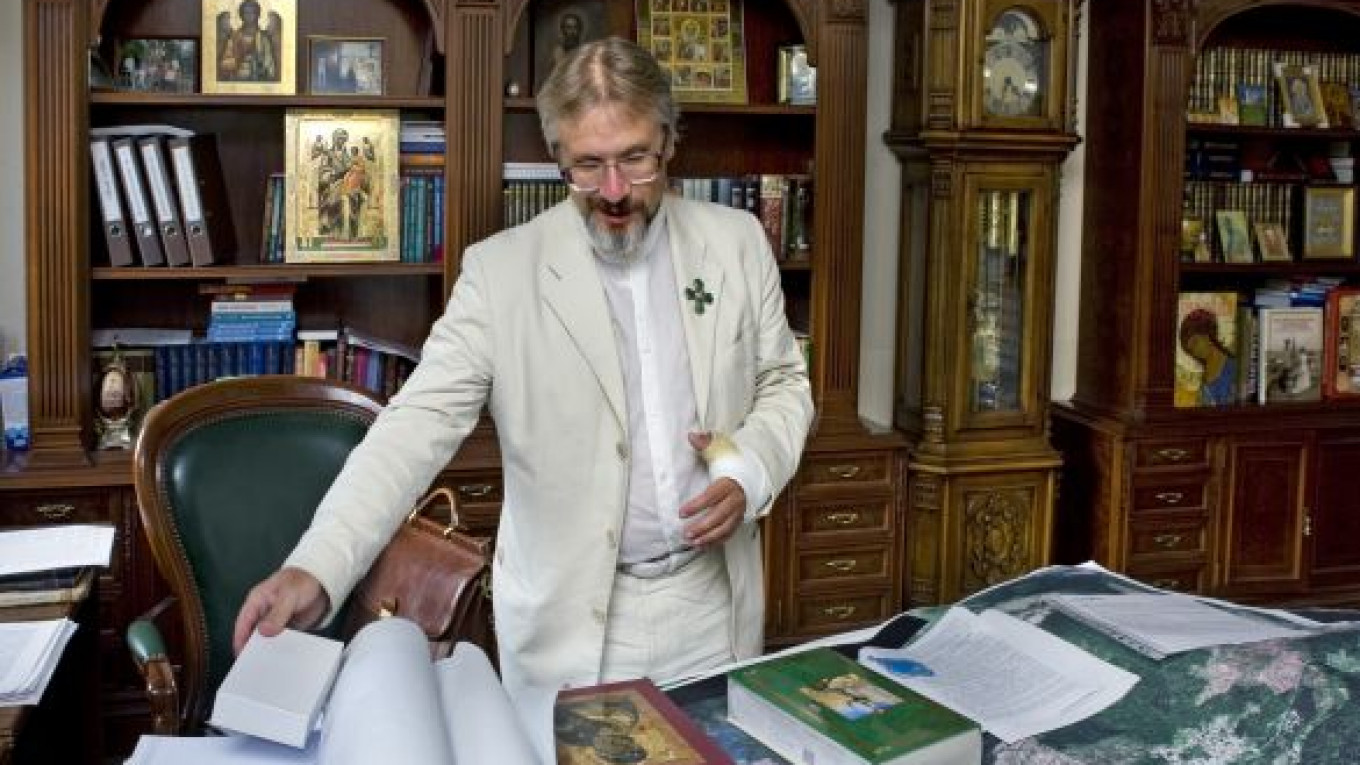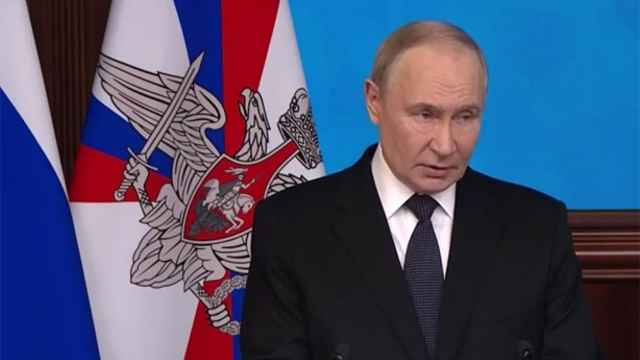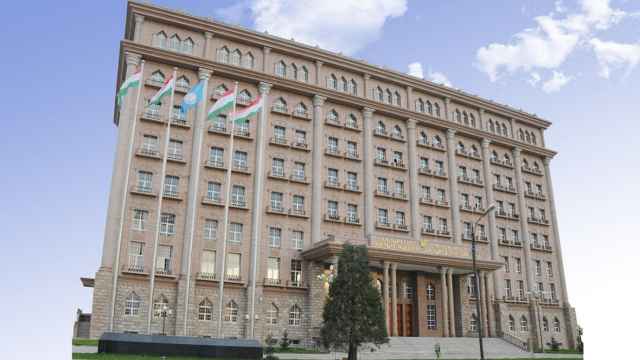If you are single, in a sexual relationship and working in the business empire of Vasily Boiko-Veliky, you had better say your marriage vows before a clergyman this week. Otherwise, you'll be fired.
“A holy man lives according to God's rules, and people who follow religious rules are the best employees,” Boiko-Veliky, 51, said during an interview in his office, surrounded by icons and books on religion.
The multimillionaire, whose interests range from dairy products to nuclear power stations, has ordered his employees who are "living in sin" to enter church marriage by Thursday, when Orthodox Christians will celebrate a holiday known as Intercession of the Theotokos, or Pokrov.
People who were married at ZAGS, the state marriage registration office, also have to retake their vows in a Russian Orthodox church.
Those who do not comply will be dismissed because their positions will be terminated, Boiko-Veliky said, making no attempt to hide the fact that the termination of the positions is only a pretext for what basically amounts to employee discrimination on religious grounds. He first warned his employees in August, giving them the two months' notice required by law to terminate a position.
Boiko-Veliky, head of the Your Own Financial Caretaker investment company with a fortune estimated at $100 million by Finans magazine, has long identified himself as a Christian, claiming to have even been expelled from the Soviet-era youth organization Komsomol over his beliefs in 1984.
But his own business background is not squeaky clean, replete with greenmail accusations, shady privatization deals and even an ongoing criminal case that required him to pay a record bail of 50 million rubles ($1.7 million) to avoid detention — an event that Gazeta.ru said played a crucial role in fanning his religious ardor.
Public activists have lashed out at Boiko-Veliky over his church marriage demands, accusing him in the media — though not in court — of violating the rights of his employees.
Laying off an employee for religious reasons is a “pure violation of the Constitution, which guarantees religious freedom,” said Lyudmila Kuzenkova, the head of human leasing and industrial projects at Ventra Employment.
She expressed doubt that the two months' notice would stand up in court. “A marriage is not part of the relationship with the employer. He or she can go to court and win back their job,” Kuzenkova said.
But Boiko-Veliky said most of his 6,000 workers are Orthodox believers and his methods are a “way to take care of employees.”
He also vowed to fire any female staffer who has an abortion. “We are not following anybody, but it would be easy to find out,” he said of any employee who got an abortion.
His spokesman said late Wednesday that about a dozen employees have gotten married since the ultimatum was made and no one has been fired yet.
Boiko-Veliky said he came up with the idea of mandatory church weddings for employees after this past summer's record heat wave and devastating forest fires — which he called punishment from God.
“The heat was a punishment for our deeds and the deeds of our fathers,” said Boiko-Veliky, referring to decades of Communist rule when atheism was the state ideology.
He has gone so far in his anti-Communist crusade as to publish open letters to President Dmitry Medvedev in several newspapers asking him to remove Vladimir Lenin's body from the mausoleum on Red Square and Soviet-era red stars from the Kremlin towers.
While Boiko-Veliky has received no reply from the Kremlin, he was able to present dairy goods produced by his company Ruzskoye Moloko to Medvedev and Prime Minister Vladimir Putin earlier this month.
The Kremlin released photos of Medvedev and Putin sampling a basket of the Ruzskoye Moloko goods that Putin received during a visit to an agriculture expo in Moscow. Among the items is Ruzskoye Moloko milk, which Boiko-Veliky said uses no preservatives, and retails at about 70 rubles ($2.30) per liter, making it among the most expensive milk brands in Russia.
In his religious drive, Boiko-Veliky was also accused of waging a bizarre war against Communist supporters in the Ruza district of the Moscow region, where his dairy and other agricultural interests are located. He is the district's major employer. In June, party supporters blamed him for destroying a local statue of Lenin, which he called an “idol” and a “scarecrow.”
But his efforts failed in August when the Communists and the local administration restored the monument. His attempts to turn Ruza farmers employed by his company into devout believers also have been met with resistance.
One manager at the agricultural enterprise complained that the combine drivers declined to put stickers reading “For a Holy Russia!” on their harvesters, asking instead for stars — a popular Soviet-era symbol used to distinguish the best workers.
Moreover, as Boiko-Veliky has sought to turn Ruza, where he owns about 37,000 hectares, into a religious stronghold, local farmers have accused him of swindling them out of more than 3,600 hectares, prompting the criminal investigation, which is ongoing.
The entrepreneur, who spent 20 months in custody in 2007 and 2008 over the case, has said he wanted to make Ruza a “local Switzerland” by building a golf course and several hotels.
Boiko-Veliky denied wrongdoing in the interview, saying he paid reasonable sums to buy the land from its previous owners. “More than 60 rulings passed by arbitration courts have proven that I am right,” he said.
Several attempts to speak with Boiko-Veliky's current and former employees were unsuccessful. Two former employees flat-out refused to discuss their ex-boss, saying the issue "was not interesting."
A Ruza resident who has several friends working at Boiko-Veliky's dairy plant said they have complained to him about being forced into the church marriages. "What else can they do if there is nothing to eat?" he said.
The businessman was born Vasily Boiko, but changed his last name to Boiko-Veliky (“Boiko the Great”) soon after posting bail and being released from detention in 2008. He said he did not want to be confused with Oleg Boiko, a wealthy entrepreneur involved in the casino business.
Boiko-Veliky started his business in the early 1990s when he got involved in the most trademark dealings of the era — buying up shares in key enterprises sold by the government in murky and often dubious privatization sales.
In particular, his company acquired a blocking state in the Bratsky aluminum plant in 1995, later reselling it to other investors.
Boiko-Veliky is also currently involved in construction of several nuclear power plants across the country — which comes as no surprise considering that he has a background in nuclear physics and even worked for the state nuclear corporation Rosenergoatom in the early 2000s.
His opponents accuse him of amassing his fortune through greenmail, which BusinessDictionary.com defines as the practice of purchasing enough shares in a company to threaten a takeover, thereby forcing the target firm to buy those shares back at a premium in order to suspend the takeover. The Kompanya business magazine has called Boiko-Veliky a “Russian Kenneth Dart,” referring to the U.S. foam cup king who waged a long battle against Yukos owner Mikhail Khodorkovsky over the oil company's assets in the 1990s.
But Boiko-Veliky insisted that he has always played by the rules, even in the 1990s.
“We have done everything honestly. We haven’t robbed or killed anyone,” he said.
He spoke with apparent humility about his own detention, but some bitterness shone through. “I took no offense against anyone, and I have forgiven all my offenders,” he said, echoing an Orthodox prayer. “But I realized that when you are placed in detention, everyone thinks that you have already been found guilty.”
Looking forward, he said all employees would soon be required to take religious lessons right in the office — a place with a relaxed atmosphere but with Orthodox icons dotting the walls and all female employees sporting modest long skirts.
“Every company has its own rules. Some need English. But we want people to know God’s rules,” Boiko-Veliky said.
Editor's note: Lyudmila Kuzenkova is the head of human leasing and industrial projects at Ventra Employment. An earlier version of this article said she was a senior manager at Avanta Personnel.
A Message from The Moscow Times:
Dear readers,
We are facing unprecedented challenges. Russia's Prosecutor General's Office has designated The Moscow Times as an "undesirable" organization, criminalizing our work and putting our staff at risk of prosecution. This follows our earlier unjust labeling as a "foreign agent."
These actions are direct attempts to silence independent journalism in Russia. The authorities claim our work "discredits the decisions of the Russian leadership." We see things differently: we strive to provide accurate, unbiased reporting on Russia.
We, the journalists of The Moscow Times, refuse to be silenced. But to continue our work, we need your help.
Your support, no matter how small, makes a world of difference. If you can, please support us monthly starting from just $2. It's quick to set up, and every contribution makes a significant impact.
By supporting The Moscow Times, you're defending open, independent journalism in the face of repression. Thank you for standing with us.
Remind me later.






